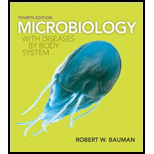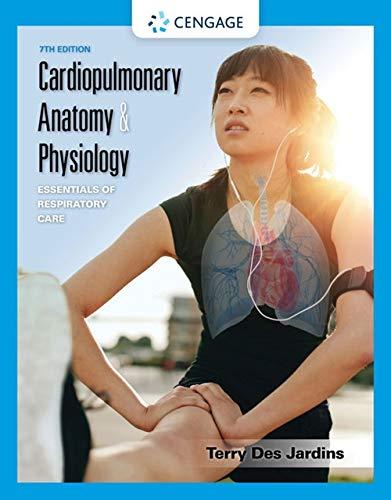
Microbiology with Diseases by Body System (4th Edition)
4th Edition
ISBN: 9780321918550
Author: Robert W. Bauman Ph.D.
Publisher: PEARSON
expand_more
expand_more
format_list_bulleted
Concept explainers
Question
Chapter 6, Problem 2FIB
Summary Introduction
Introduction:
The obligate aerobes require oxygen for its growth because this molecule serves as the final acceptor of the electron in the electron transport chain (ETC). Most of the adenosine triphosphate (ATP) molecules are generated in these organisms by the ETC. However, the same oxygen molecule is poisonous for strict or obligate anaerobes.
Expert Solution & Answer
Want to see the full answer?
Check out a sample textbook solution
Students have asked these similar questions
From your previous experiment, you found that this enhancer activates stripe 2 of eve expression. When you sequence this enhancer you find several binding sites for the gap gene, Giant. To test how Giant interacts with eve, you decide to remove all of the Giant binding sites from the eve enhancer. What results do you expect to see with respect to eve expression?
What experiment could you do to see if the maternal gene, bicoid, is sufficient to form anterior fates?
You’re curious about the effect that gap genes have on the pair-rule gene, evenskipped (eve), so you isolate and sequence each of the eve enhancers. You’re particularly interested in one of the enhancers, which is just upstream of the eve gene.
Describe an experimental technique you would use to find out where this particular eve enhancer is active.
Chapter 6 Solutions
Microbiology with Diseases by Body System (4th Edition)
Ch. 6 - Why should cardiac nurses and respiratory...Ch. 6 - Cavities Gone Wild Five-year-old Daniel appears to...Ch. 6 - Why do clinical laboratory scientists keep many...Ch. 6 - Boils in the Locker Room For several weeks,...Ch. 6 - Some students transfer some gunk from a 2-week-old...Ch. 6 - Which of the following can grow in a Petri plate...Ch. 6 - In the laboratory, a sterile inoculating loop is...Ch. 6 - Superoxide dismutase _____________. a. causes...Ch. 6 - The most reactive of the four toxic forms of...Ch. 6 - Microaerophiles that grow best with a high...
Ch. 6 - Prob. 6MCCh. 6 - Organisms that preferentially may thrive in icy...Ch. 6 - Prob. 8MCCh. 6 - Which of the following terms best describes an...Ch. 6 - In a defined medium, ______________. a. the exact...Ch. 6 - Which of the following is most useful in...Ch. 6 - Which of the following methods is best for...Ch. 6 - A Coulter counter is a(n) ________________. a....Ch. 6 - Lyophilization can be described as ___________. a....Ch. 6 - Quorum sensing is _____________. a. the ability to...Ch. 6 - Prob. 1FIBCh. 6 - Prob. 2FIBCh. 6 - Prob. 3FIBCh. 6 - Prob. 4FIBCh. 6 - Prob. 5FIBCh. 6 - Fill in the Blanks 6. Cells that shrink in...Ch. 6 - Fill in the Blanks 7. Obligate ________ exist in...Ch. 6 - Prob. 8FIBCh. 6 - Fill in the Blanks 9. Microbes that reduce N2 to...Ch. 6 - Fill in the Blanks 10. A student observes a...Ch. 6 - Fill in the Blanks 11. Chemolithotrophs acquire...Ch. 6 - Prob. 1VICh. 6 - Prob. 2VICh. 6 - High temperature affects the shape of particular...Ch. 6 - Support or refute the following statement:...Ch. 6 - Explain quorum sensing, and describe how it is...Ch. 6 - Why must media, vessels, and instruments be...Ch. 6 - Why is agar used in microbiology?Ch. 6 - What is the difference between complex media and...Ch. 6 - Draw and label the four distinct phases of a...Ch. 6 - If there are 47 cells in 1 l of sewage, how many...Ch. 6 - Prob. 9SACh. 6 - Prob. 10SACh. 6 - Explain the differences among photoautotrophs,...Ch. 6 - Contrast the media described in Tables 6.3 and 6.4...Ch. 6 - How does a chemostat maintain a constant...Ch. 6 - A scientist describes an organism as a...Ch. 6 - Pasteurization is a technique that uses...Ch. 6 - Two cultures of a facultative anaerobe are grown...Ch. 6 - Some organisms require riboflavin (vitamin B2) to...Ch. 6 - A scientist inoculates a bacterium into a complex...Ch. 6 - How can regions within biofilms differ in their...Ch. 6 - A scientific article describes a bacterium as an...Ch. 6 - Prob. 8CTCh. 6 - Prob. 9CTCh. 6 - Starting with 10 bacterial cells per milliliter in...Ch. 6 - Suppose you perform a serial dilution of 0.1-ml...Ch. 6 - How might the study of biofilms benefit humans?Ch. 6 - The filamentous bacterium Beggiatoa gets its...Ch. 6 - Given that Haemophilus ducreyi is a...Ch. 6 - Examine the graph in Figure 6.3. Note that the...Ch. 6 - Prob. 16CTCh. 6 - Using the terms in Figure 6.8a, describe the...Ch. 6 - Prob. 18CTCh. 6 - Prob. 19CTCh. 6 - Prob. 20CTCh. 6 - Prob. 21CTCh. 6 - Prob. 22CTCh. 6 - Viable plate counts are used to estimate...Ch. 6 - Prob. 1CM
Knowledge Booster
Learn more about
Need a deep-dive on the concept behind this application? Look no further. Learn more about this topic, biology and related others by exploring similar questions and additional content below.Similar questions
- For short answer questions, write your answers on the line provided. To the right is the mRNA codon table to use as needed throughout the exam. First letter U บบบ U CA UUCPhe UUA UCU Phe UCC UUG Leu CUU UAU. G U UAC TV UGCys UAA Stop UGA Stop A UAG Stop UGG Trp Ser UCA UCG CCU] 0 CUC CUA CCC CAC CAU His CGU CGC Leu Pro CCA CAA Gin CGA Arg CUG CCG CAG CGG AUU ACU AAU T AUC lle A 1 ACC Thr AUA ACA AUG Mot ACG AGG Arg GUU GCU GUC GCC G Val Ala GAC Asp GGU GGC GUA GUG GCA GCG GAA GGA Gly Glu GAGJ GGG AACASH AGU Ser AAA1 AAG Lys GAU AGA CAL CALUCAO CAO G Third letter 1. (+7) Use the table below to answer the questions; use the codon table above to assist you. The promoter sequence of DNA is on the LEFT. You do not need to fill in the entire table. Assume we are in the middle of a gene sequence (no need to find a start codon). DNA 1 DNA 2 mRNA tRNA Polypeptide C Val G C. T A C a. On which strand of DNA is the template strand (DNA 1 or 2)?_ b. On which side of the mRNA is the 5' end (left or…arrow_forward3. (6 pts) Fill in the boxes according to the directions on the right. Structure R-C R-COOH OH R-OH i R-CO-R' R R-PO4 R-CH3 C. 0 R' R-O-P-OH 1 OH H R-C-H R-N' I- H H R-NH₂ \H Name Propertiesarrow_forward4. (6 pts) Use the molecule below to answer these questions and identify the side chains and ends. Please use tidy boxes to indicate parts and write the letter labels within that box. a. How many monomer subunits are shown? b. Box a Polar but non-ionizable side chain and label P c. Box a Basic Polar side chain and label BP d. Box the carboxyl group at the end of the polypeptide and label with letter C (C-terminus) H H OHHO H H 0 HHO H-N-CC-N-C-C N-C-C-N-GC-OH I H-C-H CH2 CH2 CH2 H3C-C+H CH2 CH2 OH CH CH₂ C=O OH CH2 NH2arrow_forward
- please draw in what the steps are given. Thank you!arrow_forwardplease draw in and fill out the empty slots from image below. thank you!arrow_forwardThere is a species of eagle, which lives in a tropical forest in Brazil. The alula pattern of its wings is determined by a single autosomal gene with four alleles that exhibit an unknown hierarchy of dominance. Genetic testing shows that individuals 1-1, 11-4, 11-7, III-1, and III-4 are each homozygous. How many possible genotypes among checkered eagles in the population?arrow_forward
arrow_back_ios
SEE MORE QUESTIONS
arrow_forward_ios
Recommended textbooks for you
 Biology 2eBiologyISBN:9781947172517Author:Matthew Douglas, Jung Choi, Mary Ann ClarkPublisher:OpenStax
Biology 2eBiologyISBN:9781947172517Author:Matthew Douglas, Jung Choi, Mary Ann ClarkPublisher:OpenStax Biology: The Unity and Diversity of Life (MindTap...BiologyISBN:9781305073951Author:Cecie Starr, Ralph Taggart, Christine Evers, Lisa StarrPublisher:Cengage Learning
Biology: The Unity and Diversity of Life (MindTap...BiologyISBN:9781305073951Author:Cecie Starr, Ralph Taggart, Christine Evers, Lisa StarrPublisher:Cengage Learning Biology: The Unity and Diversity of Life (MindTap...BiologyISBN:9781337408332Author:Cecie Starr, Ralph Taggart, Christine Evers, Lisa StarrPublisher:Cengage Learning
Biology: The Unity and Diversity of Life (MindTap...BiologyISBN:9781337408332Author:Cecie Starr, Ralph Taggart, Christine Evers, Lisa StarrPublisher:Cengage Learning Anatomy & PhysiologyBiologyISBN:9781938168130Author:Kelly A. Young, James A. Wise, Peter DeSaix, Dean H. Kruse, Brandon Poe, Eddie Johnson, Jody E. Johnson, Oksana Korol, J. Gordon Betts, Mark WomblePublisher:OpenStax College
Anatomy & PhysiologyBiologyISBN:9781938168130Author:Kelly A. Young, James A. Wise, Peter DeSaix, Dean H. Kruse, Brandon Poe, Eddie Johnson, Jody E. Johnson, Oksana Korol, J. Gordon Betts, Mark WomblePublisher:OpenStax College Cardiopulmonary Anatomy & PhysiologyBiologyISBN:9781337794909Author:Des Jardins, Terry.Publisher:Cengage Learning,
Cardiopulmonary Anatomy & PhysiologyBiologyISBN:9781337794909Author:Des Jardins, Terry.Publisher:Cengage Learning,

Biology 2e
Biology
ISBN:9781947172517
Author:Matthew Douglas, Jung Choi, Mary Ann Clark
Publisher:OpenStax

Biology: The Unity and Diversity of Life (MindTap...
Biology
ISBN:9781305073951
Author:Cecie Starr, Ralph Taggart, Christine Evers, Lisa Starr
Publisher:Cengage Learning

Biology: The Unity and Diversity of Life (MindTap...
Biology
ISBN:9781337408332
Author:Cecie Starr, Ralph Taggart, Christine Evers, Lisa Starr
Publisher:Cengage Learning


Anatomy & Physiology
Biology
ISBN:9781938168130
Author:Kelly A. Young, James A. Wise, Peter DeSaix, Dean H. Kruse, Brandon Poe, Eddie Johnson, Jody E. Johnson, Oksana Korol, J. Gordon Betts, Mark Womble
Publisher:OpenStax College

Cardiopulmonary Anatomy & Physiology
Biology
ISBN:9781337794909
Author:Des Jardins, Terry.
Publisher:Cengage Learning,